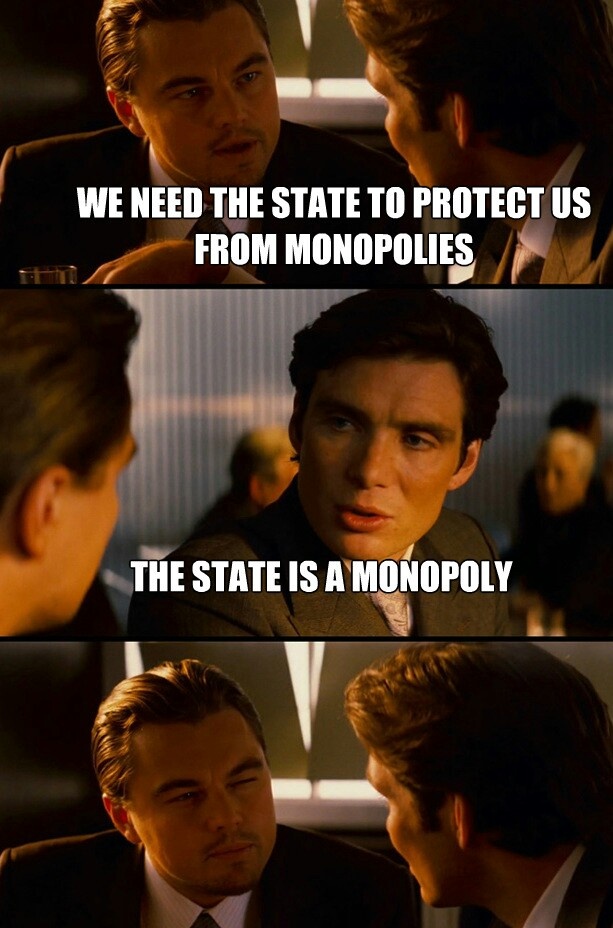Corporate Monopoly Explained

The modern view of a corporate monopoly is of a greedy evil private corporation which controls the prices of the products it sells and exploits the consumers and its workers. In economic terms, such kind of corporate monopoly is called a cohesive monopoly. A cohesive monopoly is a monopoly which establishes its control over the market by the means of government granted privileges or regulations which hampers competition or makes it very expensive for any private individual to provide an alternative which threatens the monopoly of the corporation which had lobbied the government to protect its interests.
Governments usually makes this possible by imposing rules, regulations, licensing laws, zoning laws, environmental regulations and most of all, the antitrust laws on the economy and on the private affairs of individuals. Cohesive monopolies are the symptoms of government meddling in the economy because there is no reason whatsoever for private companies to establish its monopoly over the market through government if governments don’t posses the powers to do so. Companies can only earn money by selling its products. Thus they are dependent on consumers to earn a living and on workers to produce those earnings. A cohesive corporate monopoly can exploit those consumers and workers only when consumers and workers have no alternatives.
For example, coal miners in India have one of the most dangerous working conditions and low wages despite of so many labour unions. The Indian coal industry is fully controlled by a government owned corporation named Coal India and it auctions the mines to private contractors. The majority of the coal is sold to thermal power plants which are also mostly owned by the government and in some cases, partly owned by private corporations too. Since the consumers and workers have to alternative to turn to due the heavily government regulated energy sector, there are no incentives for the coal bloc owners or Coal India to satisfy the consumers and their workers. Coal India also don’t have to worry about acquiring coal mines because the Indian Government posses the legal monopoly to forcefully posses any property which contains natural resources. No wonder India is the largest importer of coal despite having the world’s third largest coal reserves.
It’s childish to assume that strangers in buildings owned by a group of people which calls itself government and claims authority over our lives will design laws for the benefit of the people they rule over and would never ever use those same laws for their own personal gains. Absolute power not only corrupts absolutely, it attracts the corrupt only. Increasing the size of government is not the solution for corporate takeover of governments, rather giving governments more authority increases the incentive of corporations to control it. That’s why in an unhampered market economy, a monopoly affords no cause for alarm because even if a monopoly rises, it cannot survive unless it could kept satisfying its consumers and since there are no government regulatory laws which threatens an individual imprisonment or hefty fines if he/she fails to conform with government’s requirements for running a business, individuals are free to provide goods and services cheaper and of higher quality and compete with corporate monopolies.
For example, Kodak was once the giant of photography industry, it controlled more than eighty percent of the market share. But when the age of digital cameras (which ironically it invented) came, Kodak failed to catch up with the trend and fulfill consumer preferences for this new technology. Kodak introduced its own line of digital cameras later, but it was too late then and their products failed to satisfy the consumers. Henceforth the once mighty corporation is no more.
Ebay and Amazon have been in India for more than twenty years, but they failed to gain any kind of considerable market share. The problem was that the only mode of payment those websites provided was through credit cards and Indians don’t believe in paying a company for their product first and then just hoping that the product will arrive one day at their doorsteps. But then, two Amazon employees solved this problem. They resigned from their jobs and started their own e-commerce website called Flipkart and then introduced the concept of Cash on Delivery in India. In this service the consumers can order a product from Flipkart.com and then pay the deliveryman for the product when it arrives at the address given by the consumer. This business model has unleashed an e-commerce revolution and had also caused the emergence of many new competitors which has forced Flipkart to provide more new services like express delivery and such.